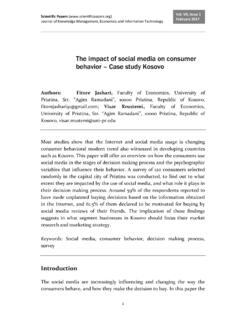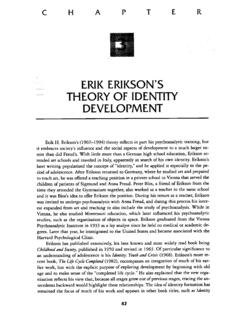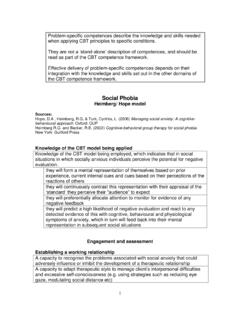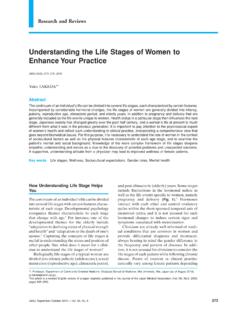Transcription of Erik Erikson's Stages of Psychosocial Development
1 Erik Erikson's Stages of Psychosocial Saul McLeod, updated 2018 Erikson s (1959) theory of Psychosocial Development has eight distinct Stages , taking in fivestages up to the age of 18 years and three further Stages beyond, well into Freud and many others, Erik Erikson maintained that personality develops in apredetermined order, and builds upon each previous stage . This is called the each stage , the person experiences a Psychosocial crisis which could have apositive or negative outcome for personality Development . For Erikson (1963), these crisesare of a Psychosocial nature because they involve psychological needs of the individual( psycho) conflicting with the needs of society ( social).According to the theory, successful completion of each stage results in a healthypersonality and the acquisition of basic virtues. Basic virtues are characteristic strengthswhich the ego can use to resolve subsequent to successfully complete a stage can result in a reduced ability to complete furtherstages and therefore a more unhealthy personality and sense of self.
2 These Stages ,however, can be resolved successfully at a later CrisisBasic vs. MistrustHope0 - 1 vs. ShameWill1 - vs. GuiltPurpose3 - vs. InferiorityCompetency5 - vs. Role ConfusionFidelity12 - vs. IsolationLove18 - vs. StagnationCare40 - Integrity vs. DespairWisdom65+1. Trust vs. Mistrust1/11Is the world a safe place or is it full of unpredictable events and accidents waiting tohappen? Erikson's first Psychosocial crisis occurs during the first year or so of life (likeFreud's oral stage of psychosexual Development ). The crisis is one of trust vs. this stage , the infant is uncertain about the world in which they live. To resolve thesefeelings of uncertainty, the infant looks towards their primary caregiver for stability andconsistency of the care the infant receives is consistent, predictable and reliable, they will develop asense of trust which will carry with them to other relationships, and they will be able to feelsecure even when in this stage will lead to the virtue of hope.
3 By developing a sense of trust, theinfant can have hope that as new crises arise, there is a real possibility that other peoplewill be there as a source of support. Failing to acquire the virtue of hope will lead to thedevelopment of example, if the care has been harsh or inconsistent, unpredictable and unreliable, thenthe infant will develop a sense of mistrust and will not have confidence in the world aroundthem or in their abilities to influence infant will carry the basic sense of mistrust with them to other relationships. It mayresult in anxiety, heightened insecurities, and an over feeling of mistrust in the worldaround with Erikson's views on the importance of trust, research by Bowlby andAinsworth has outlined how the quality of the early experience of attachment can affectrelationships with others in later Autonomy vs. Shame and Doubt2/11 Autonomy versus shame and doubt is the second stage of Erik Erikson's Stages ofpsychosocial Development .
4 This stage occurs between the ages of 18 months to approximately3 child is developing physically and becoming more mobile, and discovering that he orshe has many skills and abilities, such as putting on clothes and shoes, playing with toys,etc. Such skills illustrate the child's growing sense of independence and example, during this stage children begin to assert their independence, by walkingaway from their mother, picking which toy to play with, and making choices about what theylike to wear, to eat, states it is critical that parents allow their children to explore the limits of theirabilities within an encouraging environment which is tolerant of example, rather than put on a child's clothes a supportive parent should have thepatience to allow the child to try until they succeed or ask for assistance. So, the parentsneed to encourage the child to become more independent while at the same timeprotecting the child so that constant failure is delicate balance is required from the parent.
5 They must try not to do everything for thechild, but if the child fails at a particular task they must not criticize the child for failures andaccidents (particularly when toilet training). The aim has to be self control without a loss ofself-esteem (Gross, 1992). Success in this stage will lead to the virtue of children in this stage are encouraged and supported in their increased independence,they become more confident and secure in their own ability to survive in the children are criticized, overly controlled, or not given the opportunity to assert themselves,they begin to feel inadequate in their ability to survive, and may then become overlydependent upon others, lack self-esteem, and feel a sense of shame or doubt in Initiative vs. GuiltInitiative versus guilt is the third stage of Erik Erikson's theory of Psychosocial the initiative versus guilt stage , children assert themselves more are particularly lively, rapid-developing years in a child s life.
6 According to Bee(1992), it is a time of vigor of action and of behaviors that the parents may see asaggressive."During this period the primary feature involves the child regularly interacting with otherchildren at school. Central to this stage is play, as it provides children with the opportunityto explore their interpersonal skills through initiating begin to plan activities, make up games, and initiate activities with others. If giventhis opportunity, children develop a sense of initiative and feel secure in their ability to leadothers and make , if this tendency is squelched, either through criticism or control, childrendevelop a sense of guilt. They may feel like a nuisance to others and will, therefore, remainfollowers, lacking in child takes initiatives which the parents will often try to stop in order to protect the child will often overstep the mark in his forcefulness, and the danger is that the parentswill tend to punish the child and restrict his initiatives too is at this stage that the child will begin to ask many questions as his thirst for knowledgegrows.
7 If the parents treat the child s questions as trivial, a nuisance or embarrassing orother aspects of their behavior as threatening then the child may have feelings of guilt for being a nuisance .4/11 Too much guilt can make the child slow to interact with others and may inhibit theircreativity. Some guilt is, of course, necessary; otherwise the child would not know how toexercise self-control or have a healthy balance between initiative and guilt is important. Success in this stage will lead tothe virtue of Industry vs. InferiorityErikson's fourth Psychosocial crisis, involving industry vs. inferiority occurs during childhoodbetween the ages of five and are at the stage where they will be learning to read and write, to do sums, to dothings on their own. Teachers begin to take an important role in the child s life as theyteach the child specific is at this stage that the child s peer group will gain greater significance and will become amajor source of the child s self-esteem.
8 The child now feels the need to win approval bydemonstrating specific competencies that are valued by society and begin to develop asense of pride in their children are encouraged and reinforced for their initiative, they begin to feel industrious(competent) and feel confident in their ability to achieve goals. If this initiative is notencouraged, if it is restricted by parents or teacher, then the child begins to feel inferior,doubting his own abilities and therefore may not reach his or her the child cannot develop the specific skill they feel society is demanding ( , beingathletic) then they may develop a sense of failure may be necessary so that the child can develop some modesty. Again, abalance between competence and modesty is necessary. Success in this stage will lead tothe virtue of Identity vs. Role ConfusionDuring adolescence, the transition from childhood to adulthood is most important. Childrenare becoming more independent, and begin to look at the future in terms of career,relationships, families, housing, etc.
9 The individual wants to belong to a society and fit fifth stage is identity vs. role confusion, and it occurs during adolescence, from about12-18 years. During this stage , adolescents search for a sense of self and personal identity,through an intense exploration of personal values, beliefs, and adolescent mind is essentially a mind or moratorium, a Psychosocial stage betweenchildhood and adulthood, and between the morality learned by the child, and the ethics tobe developed by the adult (Erikson, 1963, p. 245)5/11 This is a major stage of Development where the child has to learn the roles he will occupyas an adult. It is during this stage that the adolescent will re-examine his identity and try tofind out exactly who he or she is. Erikson suggests that two identities are involved: thesexual and the to Bee (1992), what should happen at the end of this stage is a reintegratedsense of self, of what one wants to do or be, and of one s appropriate sex role.
10 During thisstage the body image of the adolescent claims that the adolescent may feel uncomfortable about their body for a while untilthey can adapt and grow into the changes. Success in this stage will lead to the virtue involves being able to commit one's self to others on the basis of accepting others,even when there may be ideological this period, they explore possibilities and begin to form their own identity basedupon the outcome of their explorations. Failure to establish a sense of identity withinsociety ("I don t know what I want to be when I grow up") can lead to role confusion. Roleconfusion involves the individual not being sure about themselves or their place in response to role confusion or identity crisis, an adolescent may begin to experimentwith different lifestyles ( , work, education or political activities).Also pressuring someone into an identity can result in rebellion in the form of establishing anegative identity, and in addition to this feeling of Intimacy vs.








